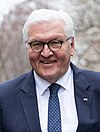German order of precedence
Appearance
This article relies largely or entirely on a single source. (March 2023) |
The German order of precedence is a symbolic hierarchy of the five highest federal offices in Germany used to direct protocol. It has no official status, but has been established in practical use.[1]
- The President of Germany, the head of state of Germany.
- The President of the Bundestag, the speaker of the German parliament, the Bundestag.
- The Chancellor of Germany, the head of the government of Germany.
- (1.) The President of the Bundesrat, the speaker of the Bundesrat, a federal legislative chamber, in which the governments of the sixteen German states are represented. The president of the Bundesrat is ex officio also deputy to the President of Germany (Basic Law, Article 57), thus becomes first in the order, while acting on behalf of the President or while acting as head of state during a vacancy of the presidency.
- The President of the Federal Constitutional Court, the supreme court of Germany.
Current office-holders
[edit]| No. | Office | Image | Incumbent | In office since | Deputy(s) |
|---|---|---|---|---|---|
| 1st |  President of Germany |
 |
Frank-Walter Steinmeier | 19 March 2017 | Manuela Schwesig President of the Bundesrat (See 4th) |
| 2nd |  President of the Bundestag |
 |
Bärbel Bas | 26 October 2021 | Aydan Özoğuz Yvonne Magwas Katrin Göring-Eckardt Wolfgang Kubicki Petra Pau Vice Presidents of the Bundestag |
| 3rd |  Chancellor of Germany |
 |
Olaf Scholz | 8 December 2021 | Robert Habeck Vice Chancellor of Germany |
| 4th (1st) |  President of the Bundesrat |
 |
Manuela Schwesig | 1 November 2023 | Peter Tschentscher First Vice President of the Bundesrat Anke Rehlinger Second Vice President of the Bundesrat |
| 5th |  President of the Federal Constitutional Court |
 |
Stephan Harbarth | 22 June 2020 | Doris König Vice President of the Federal Constitutional Court |
Living former office-holders
[edit]The order of precedence is also observed with respect to former office-holders in some cases, for example if they participate in official ceremonies as honoured guests.
- Horst Köhler, President of Germany (2004–2010)
- Christian Wulff, President of Germany (2010–2012)
- Joachim Gauck, President of Germany (2012–2017)
- Rita Süssmuth, President of the Bundestag (1988–1998)
- Wolfgang Thierse, President of the Bundestag (1998–2005)
- Norbert Lammert, President of the Bundestag (2005–2017)
- Gerhard Schröder, Chancellor of Germany (1998–2005), President of the Bundesrat (1997–1998)
- Angela Merkel, Chancellor of Germany (2005–2021)
- Bernhard Vogel, President of the Bundesrat (1976–1977 and 1987–1988)
- Björn Engholm, President of the Bundesrat (1988–1989)
- Walter Momper, President of the Bundesrat (1989–1990)
- Berndt Seite, President of the Bundesrat (1992)
- Oskar Lafontaine, President of the Bundesrat (1992–1993)
- Klaus Wedemeier, President of the Bundesrat (1993–1994)
- Edmund Stoiber, President of the Bundesrat (1995–1996)
- Erwin Teufel, President of the Bundesrat (1996–1997)
- Hans Eichel, President of the Bundesrat (1998–1999)
- Roland Koch, President of the Bundesrat (1999)
- Kurt Beck, President of the Bundesrat (2000–2001)
- Klaus Wowereit, President of the Bundesrat (2001–2002)
- Wolfgang Böhmer, President of the Bundesrat (2002–2003)
- Dieter Althaus, President of the Bundesrat (2003–2004)
- Matthias Platzeck, President of the Bundesrat (2004–2005)
- Peter Harry Carstensen, President of the Bundesrat (2005–2006)
- Ole von Beust, President of the Bundesrat (2007–2008)
- Peter Müller, President of the Bundesrat (2008–2009)
- Jens Böhrnsen, President of the Bundesrat (2009–2010)
- Hannelore Kraft, President of the Bundesrat (2010–2011)
- Horst Seehofer, President of the Bundesrat (2011–2012)
- Winfried Kretschmann, President of the Bundesrat (2012–2013)
- Stephan Weil, President of the Bundesrat (2013–2014)
- Volker Bouffier, President of the Bundesrat (2014–2015)
- Stanislaw Tillich, President of the Bundesrat (2015–2016)
- Malu Dreyer, President of the Bundesrat (2016–2017)
- Michael Müller, President of the Bundesrat (2017–2018)
- Daniel Günther, President of the Bundesrat (2018–2019)
- Dietmar Woidke, President of the Bundesrat (2019–2020)
- Reiner Haseloff, President of the Bundesrat (2020–2021)
- Bodo Ramelow, President of the Bundesrat (2021–2022)
- Peter Tschentscher, President of the Bundesrat (2022–2023)
- Hans-Jürgen Papier, President of the Federal Constitutional Court (2002–2010)
- Andreas Voßkuhle, President of the Federal Constitutional Court (2010–2020)
Trivia
[edit]As of November 2023, 111 persons have held at least one of the five highest German federal offices. Eight of them were female:
- Annemarie Renger, President of the Bundestag (1972–1976)
- Rita Süssmuth, President of the Bundestag (1988–1998)
- Jutta Limbach, President of the Federal Constitutional Court (1994–2002)
- Angela Merkel, Chancellor of Germany (2005–2021)
- Hannelore Kraft, President of the Bundesrat (2010–2011)
- Malu Dreyer, President of the Bundesrat (2016–2017)
- Bärbel Bas, President of the Bundestag (incumbent since 2021)
- Manuela Schwesig, President of the Bundesrat (incumbent since 2023)
The following people have held two different of these offices:
- Kai-Uwe von Hassel, President of the Bundesrat (1955–1956), President of the Bundestag (1969–1972)
- Willy Brandt, President of the Bundesrat (1957–1958), Chancellor of Germany (1969–1974)
- Kurt-Georg Kiesinger, President of the Bundesrat (1962–1963), Chancellor of Germany (1966–1969)
- Karl Carstens, President of the Bundestag (1976–1979), President of Germany (1979–1984)
- Johannes Rau, President of the Bundesrat (1982–1983 and 1994–1995), President of Germany (1999–2004)
- Roman Herzog, President of the Federal Constitutional Court (1987–1994), President of Germany (1994–1999)
- Gerhard Schröder, President of the Bundesrat (1997–1998), Chancellor of Germany (1998–2005)
Notes
[edit]References
[edit]- ^ "Protokollarische Rangfragen". Archived from the original on 2017-07-16. Retrieved 2017-09-17.
